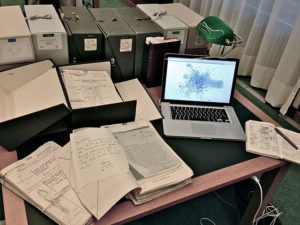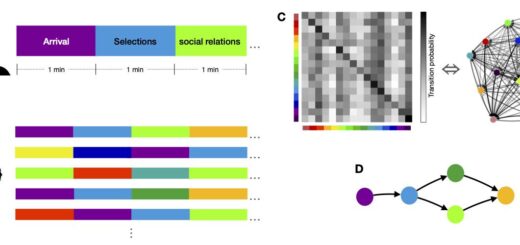Tuesday 8 December 2020 – Postgraduate Panel I – Ngozi Edeagu (Bayreuth), Benjamin Pelling (King’s), Callum Booth (Sheffield)
This seminar is 5:30 pm – 6:30 pm, 8 December 2020, live online at our YouTube channel – direct link https://www.youtube.com/watch?v=8EBv1N5F1Ss.
Session chair: TBC
The IHR Digital History Postgraduate Panels showcase historical research using digital methods that is taking place in the postgraduate community. A series of short papers will be followed by a question and answer session. You can ask questions on Twitter (@IHRDigHist), via the hashtag #dhist, or in the YouTube chat window.
Benjamin Pelling (King’s)
Title: Digital Research Methods and the Founding of the United States of America
Abstract: This paper highlights my PhD research into the American constitutional ratification campaign (1787-1788) using the digitised documents that form the Documentary History of the Ratification of the Constitution. The resulting data has been used to assess the major interpretative frameworks that have been used to understand the founding of the United States. This paper will outline the three core digital methods that have been applied during my research: Topic Modeling is used to expose the underlying themes within the documents; Network maps are then created to visualise similarities and exceptions among the different topics; and newspaper re-print data will be geo-mapped and cross-referenced with the underlying topics to assess regional differences in thematic dominance.
Bio: I am a PhD History student at King’s College London, in my 4th year and about to enter into write-up status. My thesis is provisionally titled ‘Digital Research Methods and the Founding of the United States of America’ in which I use a number of digital methods, such as Topic Modelling, network visualisations and Geo-mapping, in order to investigate the US Constitutional Ratification campaign (1787-1788).
Ngozi Edeagu (Bayreuth)
Title: ‘Searching’ for Agency and Representation: The ProQuest Black Newspaper Collection and the Global Public Sphere, 1937-1957
Abstract: My dissertation research utilises digitized Black American newspapers with a specific focus and analysis of the global reach of the social and economic grievances of non- and semi-literate colonized Nigerian subjects. Although the use of digitized newspapers presents great research possibilities enabling researchers to consult a wider breadth of materials and interrogate it in different ways than previously possible, it also presents several pitfalls, partly related to newspaper editors’ unfamiliarity with Africa. Thus, this presentation will reflect on my experience searching for historical agency and the representation of women and workers in the Black Newspaper Collection of ProQuest’s Historical Newspapers database.
Bio: I am a second-year PhD candidate in African History at the University of Bayreuth International Graduate School of African Studies (BIGSAS), Germany, and a visiting research student at the School of History, Queen Mary University of London. My PhD is entitled, ‘Writing Back to Empire: Newspapers, Non-Elites and Decolonisation in the Global Public Sphere, 1937-1957.’
Callum Booth (Sheffield)
Title: Information Extraction and Entity Linkage in Historical Crime Records
Abstract: This research seeks to discover and invent methodology to parse en-masse a subset of the British Library Newspapers set of digitised newspapers: crime reports in nineteenth century London. The goal of this research is to corroborate and augment the existing information in the Digital Panopticon, by using newspaper reports of police court hearings to shed light on the criminal justice processes that took place before a case made it to the Old Bailey, giving historians structured access to a valuable additional source of crime data. This presentation will cover the project’s progress so far, from initial named entity recognition and entity linkage experimentation, and the research currently being carried out to help alleviate some of the pitfalls of these processes.
Bio: I am a second-year PhD student at The University of Sheffield’s Department of History. I am a computer scientist by prior education (MComp at The University of Sheffield’s Department of Computer Science), interested in natural language processing and machine learning. My thesis, ‘Information Extraction and Entity Linkage in Historical Crime Records’, will focus on the creation and usage of machine learning methods and models to parse newspaper OCR and link the resulting information to the Digital Panopticon.
Image courtesy of Calvinius, CC BY-SA 3.0, via Wikimedia Commons.


How do I join the seminar?
Hi Kelvin. Link is here https://www.youtube.com/watch?v=8EBv1N5F1Ss